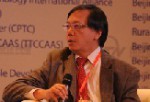What is APICC?
The Asia Pacific IC Centre (APICC) is an organization designed to assist Hong Kong companies come to grips with the modern knowledge rich economy and assist them extract maximum benefit from participating in it. IC or Intellectual Capital is a main driver of value creation in the modern economy: IC is the sum of all the knowledge and experience, some of it not explicitly shown or recorded, in a company or organization which can be used to create, extract and release value. How we use our IC often determines how successful we are.
APICC is, at one and the same time, an IC Centre for Hong Kong SAR and a link with the growing number of such IC Centres in Mainland China and around the world. The purpose of each IC Centre is to raise awareness in local businesses of the need in the knowledge based economy to identify key owned or accessible IC and to manage this for value, and to provide information and coaching.
First Steps:There were many attempts in Hong Kong and around the world to define “Creative Cities”, “Creative Industries”, “Creative Assets” and “Creative Economy”. Comprehensive definitions and useful analyses from a global perspective can be found in the “Creative Economy Report 2008”, prepared by the United Nations Conference on Trade and Development (UNCTAD). This is just a beginning, and more work need to be done. However, the real value is to be found in creativity in all industries and organizations since this is what catalyses breakthrough innovation.
Why was APICC Created?
APICC was created to address a need which we identified in Hong Kong SAR. Larger companies have shown since 1995 that there are great benefits to be obtained in managing the knowledge base of companies as part of the business plan. Since 2000 several countries, notably Scotland, Singapore and Syria, have put IC Centres in place to help local companies understand the issues, raise their awareness, diagnose their position and take steps to leverage this knowledge base in order to create value. As one example, the step of transforming key tacit knowledge into explicit recorded knowledge is vital in risk reduction in that it creates a recorded and systematised approach that is not dependent on one key individual but part of the company structural capital. APICC has been created to assist Hong Kong SAR companies in this regard, to allow Hong Kong SAR to begin to catch up with the world leaders in the Knowledge Economy and to link Hong Kong into the ambitious Mainland China IC Centres Project.


